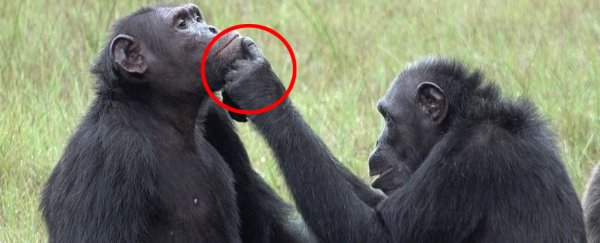In 2019, Alessandra Mascaro, a volunteer and budding evolutionary biologist for The Loango Chimpanzee Project, noticed something no other primatologist in Africa had reported before.
In the forests of Gabon, while following and filming a female chimpanzee Suzee and her son Sia, Mascaro noticed Suzee clamp something tiny between her lips, before applying the invisible matter to a wound on Sia's foot.
Looking back at her footage, Mascaro realized Suzee had snatched the topical treatment straight from the underside of a leaf. It looked like a tiny, dark insect.
"Discussing these observations and the possible function of the behavior with the team members, we realized that we had never seen such a behavior and that it had also never been documented before," says Mascaro.
Once aware of the practice, Mascaro and her colleagues began to notice it regularly.
A week after Mascaro's sighting, Lara Southern, a PhD student on the research team, watched as an adult male chimpanzee pulled a leaf towards his mouth, picked up an insect with his lips, and grabbed the creature with his thumb and forefinger. The chimp then applied what he'd snatched from the shrub to a day-old wound in the crook of his arm.
Over the next 15 months, researchers for the chimpanzee project carefully documented 20 other similar events on the west coast of Africa. Most of the time, the chimpanzees in Gabon applied the unidentified insects to their own wounds, but there were several occasions in which they also helped each other out.
"An adult male, Littlegrey, had a deep open wound on his shin and Carol, an adult female, who had been grooming him, suddenly reached out to catch an insect," recalls Southern.
"What struck me most was that she handed it to Littlegrey, he applied it to his wound and subsequently Carol and two other adult chimpanzees also touched the wound and moved the insect on it. The three unrelated chimpanzees seemed to perform these behaviors solely for the benefit of their group member."
Prosocial behaviors that promote empathy amongst a group of animals are controversial in evolutionary biology, as they seem to undermine the basic 'selfishness' of survival.
Self-medication is quite common in the animal kingdom, seen in birds, bees, lizards, elephants, and chimpanzees, but selfless behaviors with regards to medicine are exceedingly rare.
While chimpanzees and bonobos have been observed swallowing the leaves of medicinal plants to help ward off intestinal infections, the topical application of insects as medicine is a new discovery.
"Our observations provide the first evidence that chimpanzees regularly capture insects and apply them onto open wounds," says primatologist Tobias Deschner from the University of Massachusetts.
"We now aim to investigate the potential beneficial consequences of such a surprising behavior."
The insects used by the chimpanzees for this topical treatment have yet to be identified, but judging by how quickly the primates must move to snatch the dark-colored arthropods from their surroundings, the authors suspect they are probably winged and hold some sort of anti-inflammatory or antiseptic properties.
Humans themselves are known to use insects in a very similar way, as the small bodies of some invertebrates hold medicinal properties. Written records, for instance, indicate that 'maggot therapy' has been used by humans to treat wounds for thousands of years all over the world.
Despite decades-worth of chimpanzee observations in Africa, however, this is the first time we've noticed a similar behavior among our closest living relatives, and it suggests our species isn't the only one to play the roles of doctor and patient.
Chimpanzees are known to display several behaviors that appear to be prosocial on the surface, including food sharing, adoption, territorial patrols and cooperative hunting, but the meaning and purposes of these acts are debated among evolutionary biologists. Some other studies suggest chimps are only concerned with their own wellbeing.
The topical application of medicine to another chimp's wounds strengthens the idea that humans aren't the only ones who can act in the interests of another. Studying chimps further could help us understand how such prosocial behaviors first began to evolve and what their evolutionary benefits might be.
"It is just fascinating to see that after decades of research on wild chimpanzees they still surprise us with unexpected new behaviors," says Deschner.
"Our study shows that there is still a lot to explore and discover about our closest living relatives, and we therefore need to still put much more effort into protecting them in their natural habitat."
The study was published in Current Biology.
